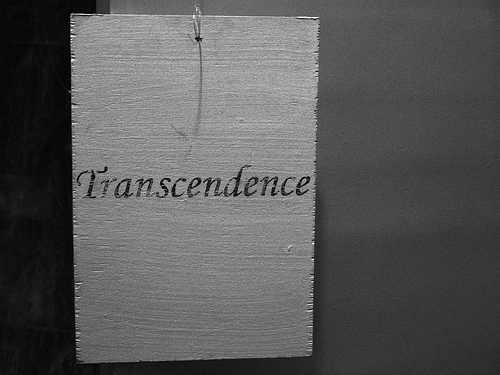We run our website the way we wished the whole internet worked: we provide high quality original content with no ads. We are funded solely by your direct support. Please consider supporting this project.

Crucifying Transcendence
The classical view of God’s transcendence in theology is in large borrowed from a major strand within Hellenistic philosophy. In sharp contrast to ancient Israelites, whose conception of God was entirely based on their experience of God acting dynamically and in self-revelatory ways in history, the concept of God at work in ancient Greek philosophy was a concept that explained all that was not self-explanatory—namely, the contingent, ever-changing, limited, compound world.
This explanation, these philosophers generally assumed, must constitute the antithesis of all that needs to be explained. Hence, for all the significant differences among the Platonic, Stoic, and Peripatetic philosophers who comprise this strand of thought about the nature of God, the logic moved away from contingency, change and composite being and moved toward a reality that was altogether necessary, unchanging, and simple—“the One,” as it came to be known. Contingency, change, and composite being came to be viewed as inferior and less real than that which is necessary, unchanging and simple.
The dominant way these philosophers worked toward their ultimate explanation of God was by attempting to form a conception of a reality, God’s transcendence, that remains when all that is not self-explanatory is stripped away.
The first unambiguous example of this was Anaximander’s concept of aperion – the “indefinite.” By the second and third centuries, it was widely assumed in Hellenistic philosophical circles that God (or “the One”) was altogether simple and “above” contingency, becoming, limitations, emotions and rational thought and possibly time.
The literature debating the extent to which early church fathers were or were not influenced by this concept of God is massive. I will simply make one observation. Contemporary defenders of the early church fathers tend point out that these fathers ascribed activities and attributes to God that are inconsistent with the Hellenistic conception of God and that they significantly modified the meaning of the Hellenistic philosophical concepts that they ascribed to God. I believe these defenses are, to a large degree, successful in refuting the advocates of a strong Hellenistic influence on the church’s theology. But, from my perspective, they fail to see the forest through the trees in terms of the kind of influence that I assert regarding the influence of Hellenistic thought on theology.
My contention is that the influence isn’t at the level of any particular ideas. It concerns the fundamental difference between the Hellenistic conception of God that is arrived at by moving away from the contingent world and the Hebraic conception of God that is received as a revelation as God moves toward, interacts with, and eventually unites himself to the contingent world in the person of Jesus Christ. It’s my contention that, if people start and orient all their theological reflection around the One in whom God united himself to the world of contingent becoming, it would never occur to them to arrive at a conception of God’s transcendence that is the negation of contingency and becoming, —that is, a conception of God’s transcendence as essentially atemporal, immutable, and impassible.
To be more specific, if we resolve that all our reflections about God are to be anchored in the one in whom God became a man, would it ever occur to us to think that God’s essence is above time and devoid of becoming? If our thinking about God never veers from the one who was tortured and crucified at the hands of wicked agents, would it ever occur to us to imagine that God’s essence can’t be affected by anything outside of God? If our thinking about God remains steadfastly focused on the one who suffered a hellish death on the cross, would it ever occur to us to think that God’s essence never suffers? And if all our thinking is oriented around the crucified Christ, would it ever occur to us to imagine a God whose essence had no “before“ or “after” and whose essence had no potential to change, or to be affected?
So far as I can see, the answer to all such questions is a definitive “no.” If all our reflections on God’s transcendence are, from start to finish, focused on the crucified Christ, I believe we are rather empowered to discern God’s glorious transcendence not over-and-against the Crucifixion, but in the Crucifixion itself, precisely when God becomes our sin and the Son experiences abandonment by the Father.
Image by denn via Flickr.
Category: General
Tags: Church Fathers, Cross, Cruciform Theology, God, Jesus, Philosophy, Platonism, Transcendence
Topics: Attributes and Character
Related Reading

Why Did It Take SO Long for God to Reveal Himself in Jesus?
Greg talks about why it took God so long to reveal himself in Jesus. http://traffic.libsyn.com/askgregboyd/Episode_0048b.mp3

How the Cross Erases Your Sin
In Colossians 2:14, we read how God canceled the charge of our legal indebtedness which stood against us and condemned us. That word “canceled,” means to wipe out, to erase, or to abolish. By means of the cross, God wiped out our indebtedness to the law that stood over us that Satan used to condemn…

What is your perspective on the classical view that God is above time?
In a major strand of hellenistic (Greek) philosophy, change was seen as being an imperfection. This idea was adopted by many early Church fathers and eventually became almost an assumed dogma of the Church. It was thus assumed that, since God is perfect, he must be above all change. Not only does his character and…

Sermon: Letter to Henry
We usually share a short clip from Greg’s sermons here, but we decided that a clip just won’t do this week. This last weekend Greg preached about the life and death of Henry and what it does and does not say about God. You can listen to the sermon and download other resources over at…

What Happened on the Cross?
Since the time of Anselm (11th century), and especially since the Reformation in the 16th century, the tendency of the Western church has been to focus almost all of its attention on the anthropological dimension of the atonement, usually to the neglect of the cosmic dimension that is central to the NT. In the standard…

